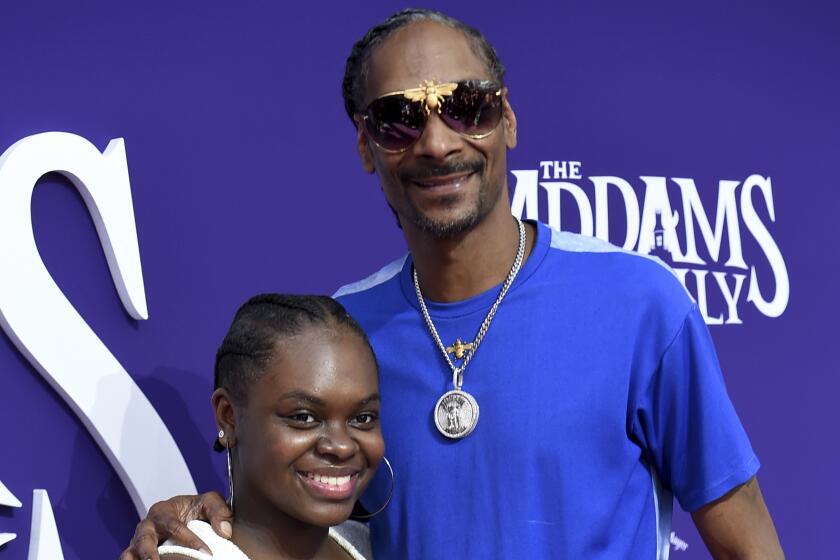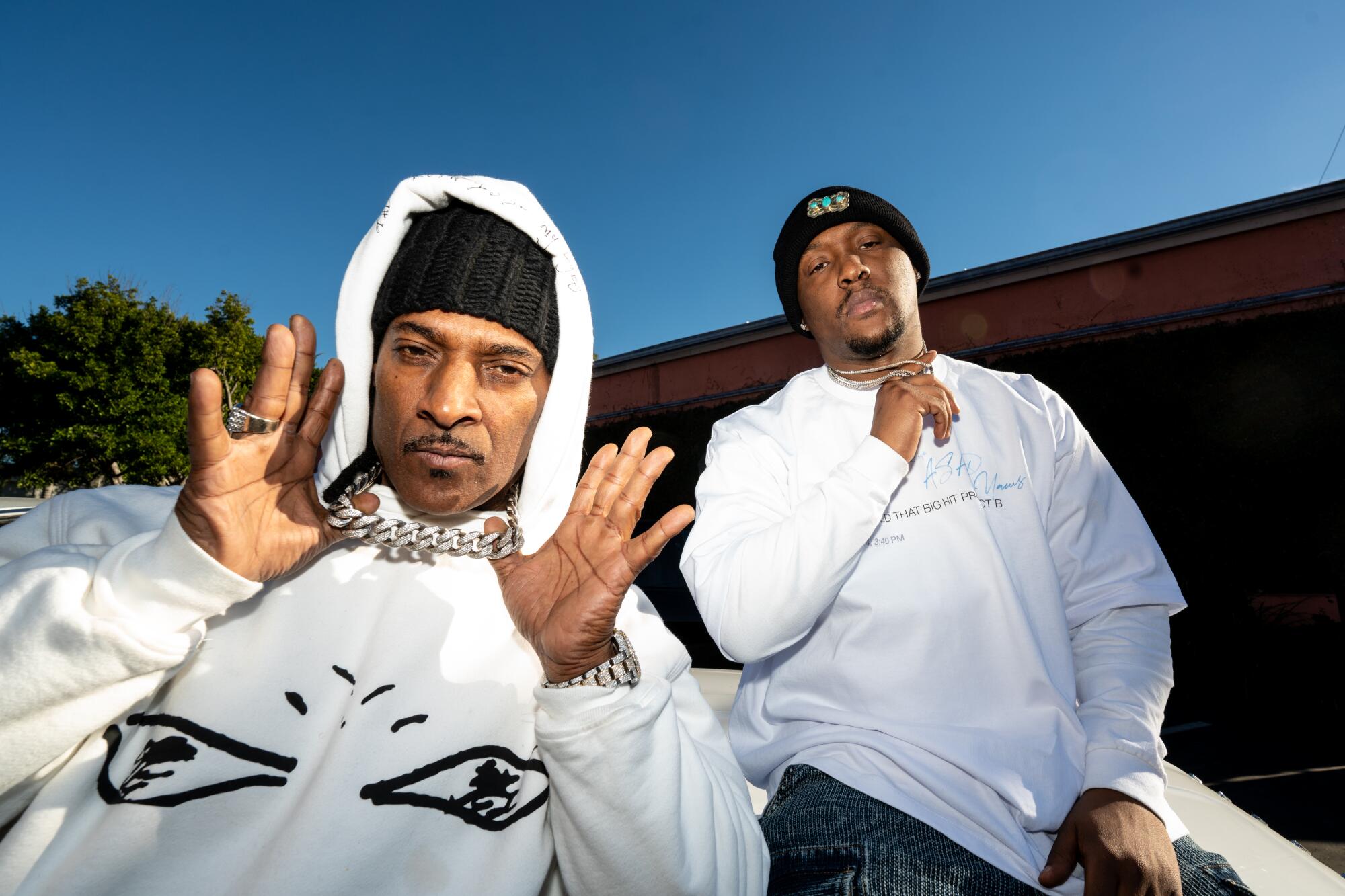
- Share via
Snoop Dogg’s private, self-branded Doggyland casino resides in an unmarked building in Inglewood, and on a mid-January Monday, its paisley print blackjack table and Indoggo-branded bar were commandeered by Buffalo, N.Y., rapper Benny the Butcher for a video shoot.
With cameras rolling, Snoop and Benny cackled in drunken laughter at the center of the scene, while rapping along to their forthcoming collaboration. To their left sat Hit-Boy, the song’s producer, while Big Hit — Hit-Boy’s father — served as a human money counter on their right, throwing bills and twisting fingers.
“Big Hit, what up?” Snoop Dogg exclaimed as the two exchanged a dap in between shots. “I just bought your album again. Too damn important.”
Later that same week — on the other side of a quick Las Vegas sprint that found them in an impromptu session with Ty Dolla Sign — Hit-Boy and Big Hit hunkered down at Chalice Studios, bobbing heads in unison while watching and rewatching the final product. Once they’ve soaked in every shot to their satisfaction, Hit-Boy plopped in front of his computer and scrolled through his assortment of samples; as soon as he settled on a vocal chop, Big Hit worked through a verse idea, freestyling references and metaphors while trying to catch the beat.
“All of this is a dream come true,” said Big Hit, 52. “It feels like a fairy tale.”
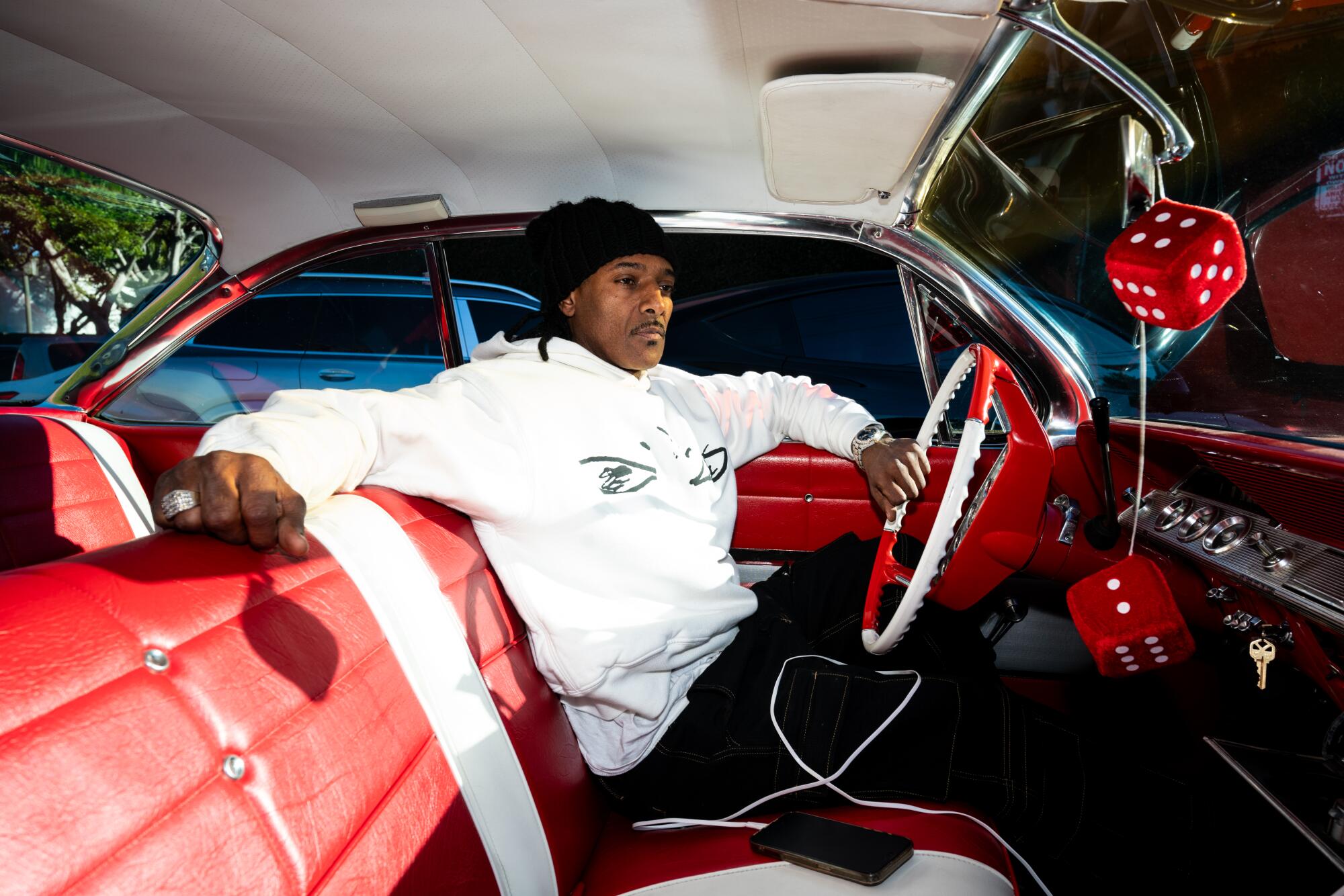
This freewheeling schedule of studios, shoots and A-list shoulder-rubbing is now the norm for Big Hit, born Chauncey Hollis Sr., who’s fast-tracking the rap career he’s long envisioned in tandem with his son. But it’s also wholly unfamiliar. Big Hit has spent most of his adult life in prison on drug-related charges — from 1991 to 2004, with intermittent stints to follow — laying his head in a cell as Hit-Boy (Chauncey Hollis Jr.) established himself as one of hip-hop’s dominant producers.
While shuffling through the system, Big Hit says, he survived a brutal jumping at the hands of authorities that left him flatlined and strapped to a gurney as doctors questioned if he’d survive. “They had us standing from cell to cell for like a week, waiting to get a bed,” he recalled. “We made a plan to stand up for our rights, and got screamed on and boo-bopped. They went overboard with me, because I was the one who wouldn’t stop.”
Snoop Dogg’s 24-year-old daughter Cori Broadus revealed on Instagram that she suffered a ‘severe’ stroke early Thursday morning.
In prison, he contracted COVID three separate times. Workouts required cramming letters into bags to facilitate biceps curls; he learned to stuff his bedsheets in the vents to catch the dust and protect from respiratory illness. When he was released in May 2023, he brought home his final prison meal — two slices of bread and bologna — as a spoiled reminder of the conditions he survived, and the place he can’t allow himself to return.
“I wish I had somebody to really tell me the other side of the dope game,” he said. “It was all true — the glitter, the girls, the cars, the money, and all that. But people wouldn’t lace you up on the darker side of the situation. I lost everything. The struggle is real in there.”
Meanwhile on the outside, Hit-Boy, 36, dove headfirst into music while stashing earnings to send to his father and care for his mother. His most commercially successful creations are as thunderous as they are unavoidable: Kanye West and Jay-Z’s “N— in Paris,” Kendrick Lamar’s “Backseat Freestyle,” Beyoncé’s “Sorry,” Travis Scott’s “Sicko Mode.”

This February he’ll return to the Grammys, where he’s again nominated for producer of the year, and for the first time in his career, he’ll walk the red carpet with his mother, father and 3-year-old son.
It’s a moment he and his father have long visualized.
“I’ve won three Grammys, but my pops has never been out to see it,” Hit-Boy said. “We want that producer of the year award. Not too many Black people have even been nominated — let alone won — so being considered is already dope. It’d mean a lot to the younger me; ‘you really did what you wanted to do.’ ”
But beyond the gold trophy, Hit-Boy’s primary focus has been helping his father establish a new life, rehabilitated through the music rather than the streets. It’s a dream birthed in 2014, when Big Hit featured on Hit-Boy’s posse cut “Grindin’ My Whole Life” and caught a local hit through the waterworks-inducing “G’z Don’t Cry,” but the candle was snuffed out after Big Hit committed a hit-and-run in Humboldt County, sending him away once again, this time for nine years. (Big Hit says he was robbed after the crash and fled the scene as gunshots rang out, and didn’t know someone in the other car had been gravely injured.)
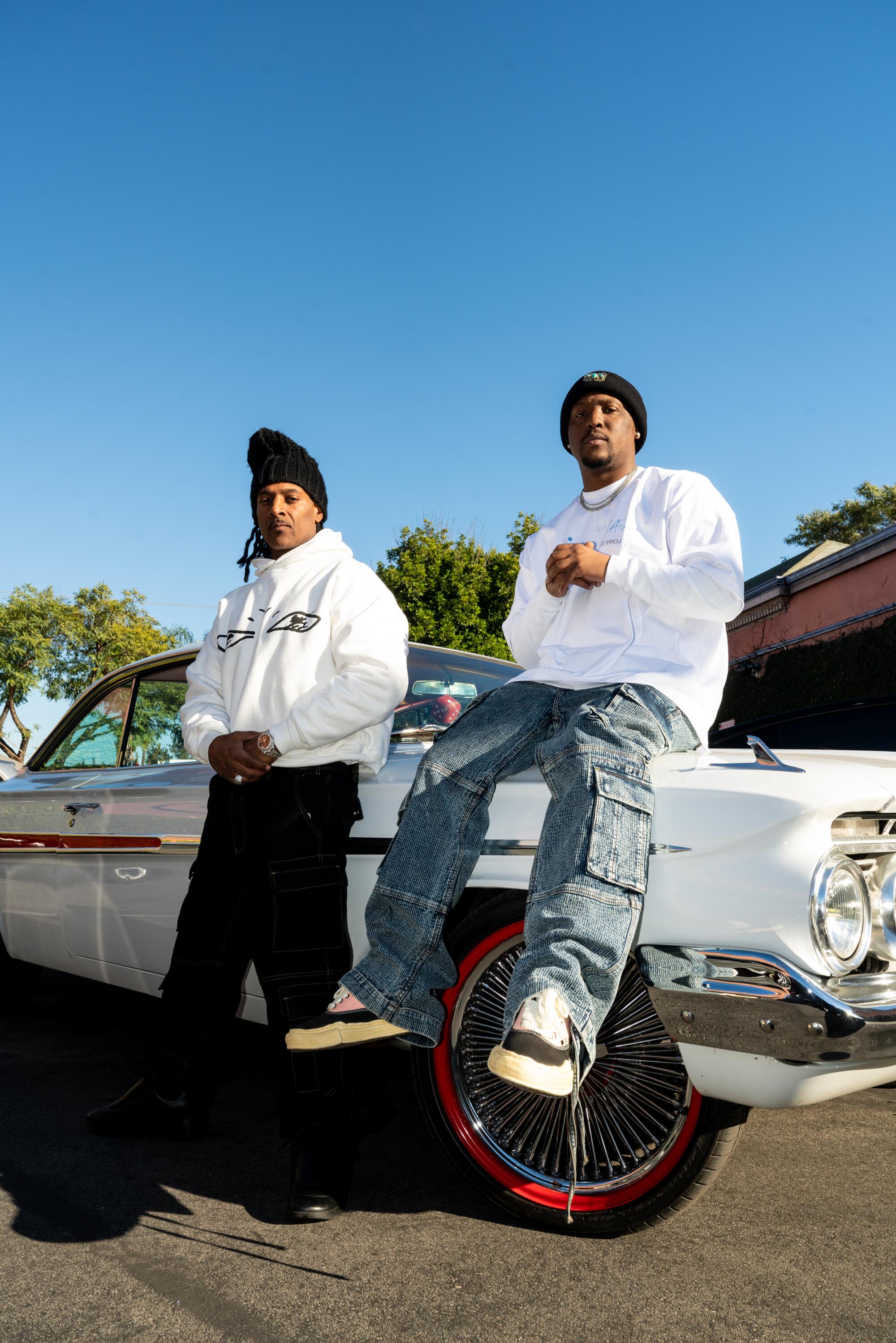
Rather than working side-by-side in the studio, Big Hit wrote rhymes in prison, plotting an eventual debut album that would be produced by his son. In December 2023, the vision was realized through “The Truth Is in My Eyes,” which wraps a lifetime’s worth of street tales into a triumphant body of work. On this album (and on “Paisley Dreams,” a collaboration project with the Game), Big Hit spits each word as if the mic could be snatched away from him at any moment.
The studio has become a safe haven for Big Hit as he acclimates himself to an entirely new world. It’s a task easier said than done, but those with a front-row seat are already seeing the shift in his mind-set.
“I sat with him in the studio for hours when he had been out for maybe 10 days, and the yard was still on him, in terms of his energy,” said DJ Hed, host at the Inglewood-based Home Grown Radio.
“He was ready to go back to what he knew how to do, to get some money,” DJ Hed continued. “I had to tell him, ‘Your son is really a legend out here, and if you go all in with the music, I think it’ll work out for you.’ I saw him at his release party, and he told me he was all for the music now, offers on the table, making money. It was a moment that reminded me why I do what I do.”
“It’s years and years of him being desensitized, thinking to himself that if he’s not seeing it right here right now, it’s not happening,” Hit-Boy said. “He’s been out eight months, but it’s really 30 years of programming. A lot of his life was taken from him.”
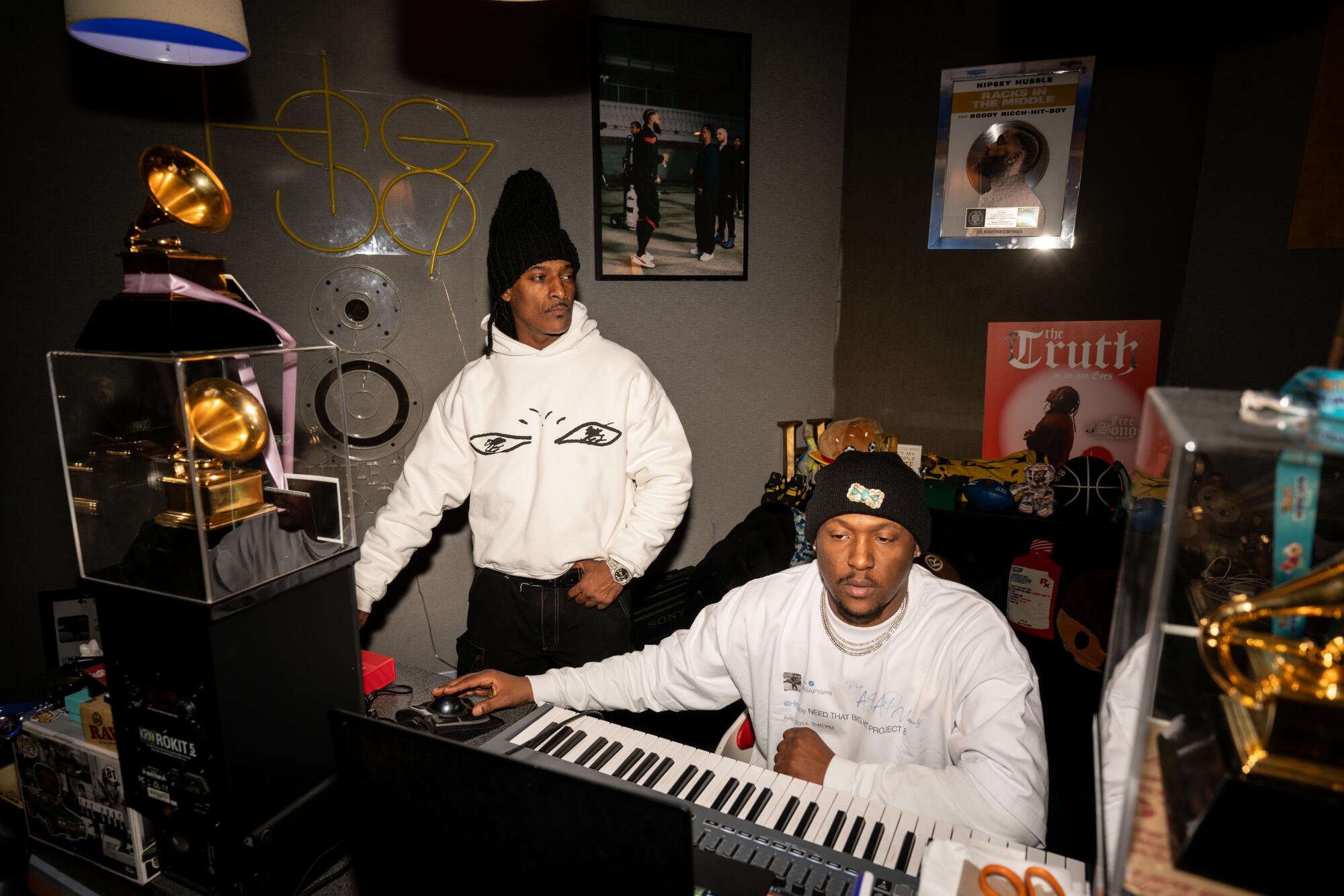
Big Hit endured a rough upbringing in Pasadena. His father, who grew up an orphan, smoked and drank with him. Big Hit was an alcoholic before he reached his teens.
He calls himself a “young brat” who made a habit of cussing out his teachers and getting into fights.
“By the time [my father] saw I was out of control, it was too late,” he said. “That beast had been shaped and molded in me. I remember one day we were on the porch, and he said, ‘You want to be just like your daddy, huh.’ I looked him in the eyes, and he told me, ‘N—, you scaring me.’ He tried to change it, but it was too late.”
Kali Uchis discusses pregnancy, breaking industry barriers and new Spanish-language album ‘Orquídeas’
Kali Uchis is pregnant. The Grammy-winning artist discusses becoming mother—literally—and how she pen palled with Latin music’s biggest stars to make her new album “Orquideas.”
Big Hit ran away at the age of 11 and turned to the streets; a natural hustler, he advanced through the ranks quickly. In 1991, he was caught with 3 kilograms of cocaine, more than a dozen guns and bundles of cash.
Hit-Boy had just turned 5 years old when his father was convicted and sent to prison for what would become 13 years, and although the two did their best to stay in contact, he felt the pain of his dad’s absence. Hit-Boy and his mother moved around Los Angeles, sleeping on floors or at friends’ and relatives’ places; at one point, the family resided in Upland, where a 2-for-99-cents promotion at Arby’s became their daily sustenance.
Hit-Boy’s uncle, Rodney Benford, was a member of Troop, the Pasadena R&B group who scored a smattering of R&B hits in the late ‘80s and early ‘90s. Some of Hit-Boy’s earliest memories were nights at his uncle’s house, giving him a firsthand look at the life a successful music career could facilitate.
“I’d go to prison to see my dad, and then I’m going back to my uncle’s house, and he’s throwing a party,” he said. “I saw the worst of the worst in prison, and the best of the best with my uncle.”
Hit-Boy tried to follow in his uncle’s footsteps and create a rap group, until his collaborators pushed the founder out of the picture. He took his future into his own hands instead, learning how to produce with a cracked copy of FL Studio and rapping into a USB microphone.
Navigating the business has proved the toughest part of the journey; seeking quick cash, Hit-Boy signed a production deal with Universal Music Publishing Group in 2007, to which he remains tied after more than a decade of fighting.
“I realized it was a bad deal in 2011, when ‘N— in Paris’ came out,” Hit-Boy said. “I thought I had my hit, it was all over the radio, so I went to UMPG, saying I need a check. They were like, ‘You already signed this contract, so it’s nothing we can really do for you.’ ”
(Thanks to help from Jay-Z and Roc Nation Chief Executive Officer Desiree Perez, he was able to finally secure an end date to his UMPG contract that will soon allow him to move on.)

Recently, he’s hit a hot streak on his joint albums with Nas, the first of which (“King’s Disease,” 2020) earned the Queens legend his first Grammy. But other high-profile collaborations have been bittersweet — Hit-Boy and his manager said the producer is still chasing royalties from a number of multi-platinum records made with major label artists.
“You’ll help someone have one of their biggest moments, and they’ll act like they don’t even know you,” Hit-Boy said. “I’ve won Grammys with people I can’t get in contact with.”
Stories like that are one reason why Hit-Boy and his dad are attempting to chart a new path, betting on themselves and building it all in-house. Nothing about what they’re doing is conventional — a 52-year-old rapper, releasing his debut album executive produced by his son. For them, releasing “The Truth Is in My Eyes” exclusively for purchase on Bandcamp, rather than making it available for streaming on Spotify and other platforms, was another empowering move, allowing true supporters to connect with the music in a deeper way.
But even more important than the album’s sales is the impact it’s already made in the community.
“I was talking to the Game, and he was telling me how many people have tried to put their cousin, or their uncle, or their family on, and it did not work at all,” Hit-Boy said. “What we’re doing is miraculous. I’ve had people say, ‘Y’all made me reach out to my dad again.’ That’s priceless to me. That’s the success.”
More to Read
The biggest entertainment stories
Get our big stories about Hollywood, film, television, music, arts, culture and more right in your inbox as soon as they publish.
You may occasionally receive promotional content from the Los Angeles Times.
